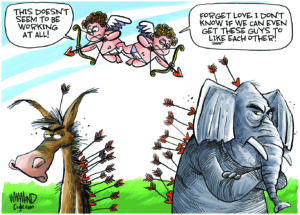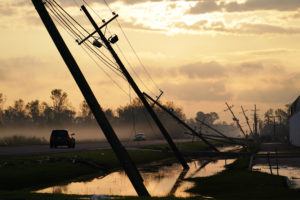On Iraq, the Candidates are Frozen in Time
Most of the presidential candidates from both parties agree that we can't allow Iraq to become a "failed state." Unfortunately, that warning is about four years out of date.WASHINGTON — Cool the rhetorical heat and you uncover a single goal that President Bush, congressional Democrats and the presidential candidates from both parties emphatically agree upon: Iraq, they say, must not become a “failed state.”
You know the riff. A failed Iraq would become a “terrorist haven.” It would be a magnet for mischievous players from throughout the Middle East. It would be another oozing sore in a region already seized with seemingly unsolvable crises. No, the Republicans say, we must keep American troops in the country indefinitely so that Iraq does not fail. No, the Democrats say, we must pull back so the Iraqis can pull themselves together and rescue themselves from this failure.
There’s a problem with this unanimity: Iraq already is a failed state.
“Basically, Iraq is on a course to violent disintegration,” says Pauline H. Baker, president of the Fund for Peace.
Along with Foreign Policy magazine, the Fund for Peace takes an annual look at nations that are most vulnerable to violence, ethnic strife, economic turmoil and social disintegration, which are the markers of “failed states.” Iraq now ranks second, behind only Sudan, which has a catastrophe in Darfur.
Iraq managed to beat out such violent, economically backward and poverty-stricken nations as Somalia. And it did so with American help. To bring Iraq to the brink, we have invested half a trillion dollars in military spending alone and staffed the largest U.S. embassy anywhere and now have 150,000 U.S. troops on the ground.
Iraq’s descent into violent chaos is known to anyone who watches the news. But it is rarely described, in our hackneyed politics, as anything other than a problematic surge in sectarianism or the handiwork of “insurgents.” In fact, all of Iraq’s social, economic and civic indicators are pointing down, according to the Fund for Peace analysis.
Consider the crises the report documents, but which do not make for good television footage: A food crisis has left half of pregnant women in Baghdad and 60 percent of schoolchildren anemic. The Iraqi government reports that “growing numbers of sick and wounded Sunnis” are abducted from hospitals when they seek treatment. In Basra, “doctors report that rotting piles of garbage left on the streets where children play are causing high rates of typhoid fever as well as fungal and bacterial skin diseases.” There is no officially recognized count of Iraqi civilian casualties.
The Office of the United Nations High Commissioner for Refugees reported Monday that the Iraq crisis has contributed to the first upsurge in five years in the number of refugees worldwide. More than 2 million Iraqis are estimated to have fled the country since the U.S. invasion and another 2 million are believed to be displaced but still living in Iraq. Then there are the bombings, the beheadings, the abductions and the other atrocities the U.S. military presence has failed to quell.
Our domestic political debate is frozen in time — a time before Iraq passed the point of no return. “Events on the ground have moved beyond it,” Baker says.
The Bush White House and, for their part, the Republican presidential candidates, continue to push a military solution that already has been shown to be no solution. The Democrats, including the party’s presidential candidates, want to withdraw combat troops but promote the notion that the factionalized and corrupt Iraqi government can somehow pick up the slack. This, too, is a fiction.
What if American politicians were still debating whether Saddam Hussein had weapons of mass destruction, whether inspections and sanctions were sufficient to control him or whether military action was the only answer? It sounds ridiculous now, because it is.
But so is the subterfuge that Iraq is not already a failure.
The Middle East contagion that has been the greatest fear of foreign policy experts is unfolding amid the U.S. military “surge.” Iran already plays a major role in Iraq’s affairs, Baker notes. Tensions between Turkey and the Kurds have reached the point of imminent conflict. The radicalism that is at the heart of civil strife among the Palestinians and in Lebanon is ascendant.
Baker’s group suggests a “managed partition” of Iraq along sectarian lines as a long-term solution. Who knows, really, what would work?
We know what won’t: Political pretensions that are mired in old-think, and that ignore a more awful reality.
Marie Cocco’s e-mail address is mariecocco(at symbol)washpost.com.
© 2007, Washington Post Writers Group
Your support matters…Independent journalism is under threat and overshadowed by heavily funded mainstream media.
You can help level the playing field. Become a member.
Your tax-deductible contribution keeps us digging beneath the headlines to give you thought-provoking, investigative reporting and analysis that unearths what's really happening- without compromise.
Give today to support our courageous, independent journalists.









You need to be a supporter to comment.
There are currently no responses to this article.
Be the first to respond.